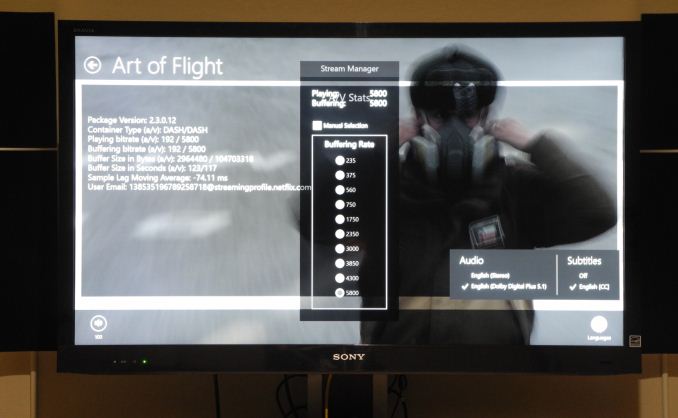The NVIDIA GeForce GTX 750 Ti and GTX 750 Review: Maxwell Makes Its Move
by Ryan Smith & Ganesh T S on February 18, 2014 9:00 AM ESTHTPC Aspects : Network Streaming Performance
Windows 7-based HTPCs need hardware acceleration in both Adobe Flash and Microsoft Silverlight for optimal streaming performance with YouTube and Netflix. The move to Windows 8.1 has made Silverlight unnecessary. The Netflix app on Windows 8.x brings a HTPC's capability on par with dedicated streaming consoles, with support for Super HD (6 Mbps) streams as well as Dolby Digital Plus bitstreaming support. The latest app also renders the video in such a way as to make taking screenshots an exercise in frustration.
As the above photograph shows, the Netflix app can be set to bitstream Dolby Digital Plus to the AV receiver and the 750Ti supports it. The video and audio streams are at 5.8 Mbps and 192 kbps respectively. It is not immediately evident as to whether GPU acceleration is being utilized. However, tracking the GPU / VPU loading and PC power consumption numbers make it obvious that it is not software decode at work in the Netflix app.
Unlike Silverlight, Adobe Flash continues to maintain some relevance right now. YouTube continues to use Adobe Flash to serve FLV (at SD resolutions) and MP4 (at both SD and HD resolutions) streams. YouTube's debug OSD indicates whether hardware acceleration is being used or not.
Similar to our Netflix streaming test, we recorded GPU / VPU loading as well as power consumption at the wall when streaming the 1080p version of the sample YouTube clip. The table below presents the relevant numbers for various configurations and streaming services.
| Streaming Video Performance | ||||||
| Netflix | YouTube | |||||
| GPU/VPU Load | Power | GPU/VPU Load | Power | |||
| NVIDIA GeForce GTX 750 Ti | 11.95/12.65% | 56.44 W | 16.26/15.74% | 55.45 W | ||
| NVIDIA GeForce GT 640 | 5.99/25.80% | 58.89 W | 15.57/25.72% | 58.93 W | ||
| AMD Radeon HD 7750 | 0.72% | 66.79 W | 3.57% | 67.11 W | ||
NVIDIA has been touting Maxwell's low power nature, and it proves to be the best of the three candidates in terms of power efficiency when it comes to GPU support for streaming services.












177 Comments
View All Comments
Harry Lloyd - Tuesday, February 18, 2014 - link
20 nm Maxwell will be epic. Gimme.TheinsanegamerN - Tuesday, February 18, 2014 - link
Imagine. OCed Geforce 690 level performance, out of a single chip, with 8 GB of RAM on a 512 bit bus, pulling the same amount of power as a geforce 770. One can dream....ddriver - Tuesday, February 18, 2014 - link
LOL, epic? Crippling FP64 performance further from 1/24 to 1/32 - looks like yet another nvidia architecture I'll be skipping due to abysmal compute performance per $ ratio...JDG1980 - Tuesday, February 18, 2014 - link
This card is designed for gaming and HTPC. Only a tiny fraction of users need FP64.nathanddrews - Tuesday, February 18, 2014 - link
So I guess we'll have to wait for the 750TIB before we can see SLI benchmarks. Two of these would be within reach of 770 while using considerably less power. Hypothetically, that is.ddriver - Tuesday, February 18, 2014 - link
You do realize the high end GPUs on the same architecture will have the same limitation?Morawka - Tuesday, February 18, 2014 - link
I thought the higher end Maxwell cards will have Denver/aRM cores on the PCB as well.Mr Perfect - Wednesday, February 19, 2014 - link
It might be a software/firmware limitation though. From what the compute enthusiasts have said, the only difference between the Titan's full compute and 780Ti's cut down compute is firmware based. They've got the same chip underneath, and some people hack their 780s for full compute. They're probably doing the same thing with the Maxwell stack.chrnochime - Wednesday, February 19, 2014 - link
Got link for the hack? Sounds interesting.Mr Perfect - Thursday, February 20, 2014 - link
I don't myself, but if you're interested look up IvanIvanovich over at bit-tech.net. He was talking about vbios mods and resistor replacement tweaks that can do that.